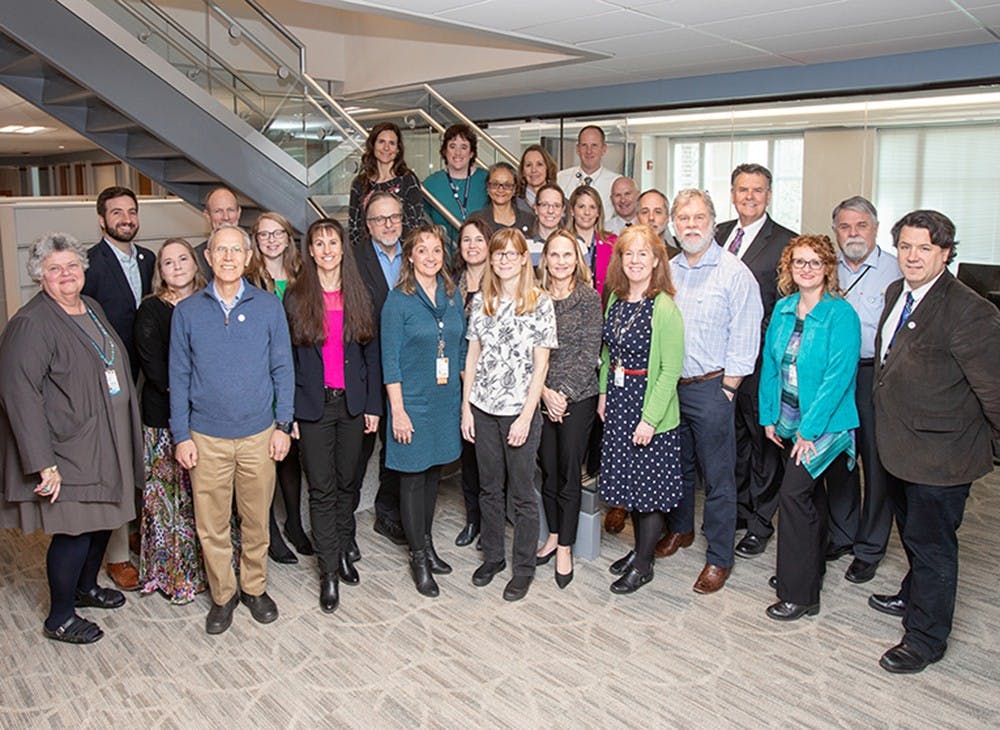This past March, the integrated Translational Health Research Institute of Virginia, a joint initiative undertaken by the University and other institutions, received a $23 million dollar grant for translational and clinical research across Virginia. This award intends to further exploration and education in the field of translational medicine, which consists of the work done to put foundational biological concepts and clinical trials into practice as feasible medical solutions.
Both the Translational Health Research Institute of Virginia, which is the University’s own program, and iTHRIV promote collaborative clinical and translational research by connecting scientists, private and public organizations, schools and health departments. These institutions use data analytics to enable sharing and integrating data across disciplines. In doing so, they facilitate the development, funding and execution of clinical trials, all in an effort to improve healthcare for the Commonwealth.
“The novelty of iTHRIV is using data in new ways to help improve the health and well-being of people from very different backgrounds and in very different locations across the Commonwealth,” said THRIV Program Director Sandra Burks.
THRIV formed in January 2017, and for six months, THRIV Directors Karen C. Johnston, M.D. and Donald Brown, Ph.D. — who is also the founding director of the Data Science Institute — devoted time to building the program’s foundation on Grounds. The University then formed iTHRIV with Inova Health System, Virginia Polytechnic Institute and State University and Carilion Clinic to support translational research across the state. iTHRIV also works with the University’s Licensing and Ventures Group and the Center for Open Science, a non-profit in Charlottesville.
“iTHRIV brings together different institutions that have different expertise, different kinds of patient populations — it brings all of those people in together, and it gives them a forum or venue that is a protected and collaborative space for people to come together to, ” Burks said.
The $23 million Clinical and Translational Science Award from the National Institutes of Health’s National Center for Advancing Translational Sciences provides federal aid to a variety of institutions across the nation. The five-year grant recipients act as central sources of medical data, streamlined processes, research tools and training for current and up-and-coming translational medicine scientists, who apply clinical research to improving human health.
Prior to applying for a CTSA, the University and its partners were tasked with demonstrating their dedication to and innovation in translational endeavors. Burks explained that as a part of this process the University designated three primary areas of focus — integration and informatics, community collaboration and education.
Burks emphasized maintaining and strengthening ties with the greater community and effectively meeting their medical needs. She cited one of THRIV’s past projects, during which the Virginia Department of Health approached THRIV and asked for help in efficiently allocating limited monetary resources to combat obesity. In response, researchers collected data on BMI and created a heat map of the state, pinpointing regions where obesity was most prevalent.
“We feel a great sense of responsibility with our community partners to help improve their access to care and their access to research and [to work] with them to address some of those health problems,” Burks said.
Collectively, iTHRIV plans to help provide accessible and personalized healthcare throughout Virginia. According to Johnston, approximately 60 percent of the state’s population receives or could receive care from one of the four partners in the program. Therefore, Johnson believes they must connect with the community to learn what is important to them.
“One of the other big goals is we want to figure out a way to really understand what our community is thinking and wanting out of research,” Johnston said. “We want to do that across the state. That takes time and investment and learning and listening from people, so that will probably take us the entire duration of the grant.”
Along with engaging those within the University and the Charlottesville community, iTHRIV aims to connect researchers in Virginia through a database known as the iTHRIV Commons. Currently in the developmental stages, iTHRIV Commons will, according to Johnston, be a platform for sharing information, datasets, data algorithms, metadata and the like. In addition, iTHRIV Commons will serve as a database for scientists to comb through curated information about other research taking place at any of the partner institutions.
“Our hope is that we will be able to access information about where the expertise is, so that if someone comes to us and says, ‘I’m looking for a partner with expertise in this,’ we want to be able to help them identify a group of people who might have that expertise,” Johnston said. “...The intent is that in this hugely collaborative environment, we can maximize the resources we have and improve research outcomes because we’re maximizing our resources.”
Over the course of the grant, iTHRIV will expand its efforts to encourage interdisciplinary research in translational medicine. The goal, Burks and Johnston said, is to train to the next generation in the ways in which to incorporate data science experts and solutions into their work. As part of that, they hope to create lasting physical and digital venues for collaboration amongst clinical and translational researchers and community partners.







